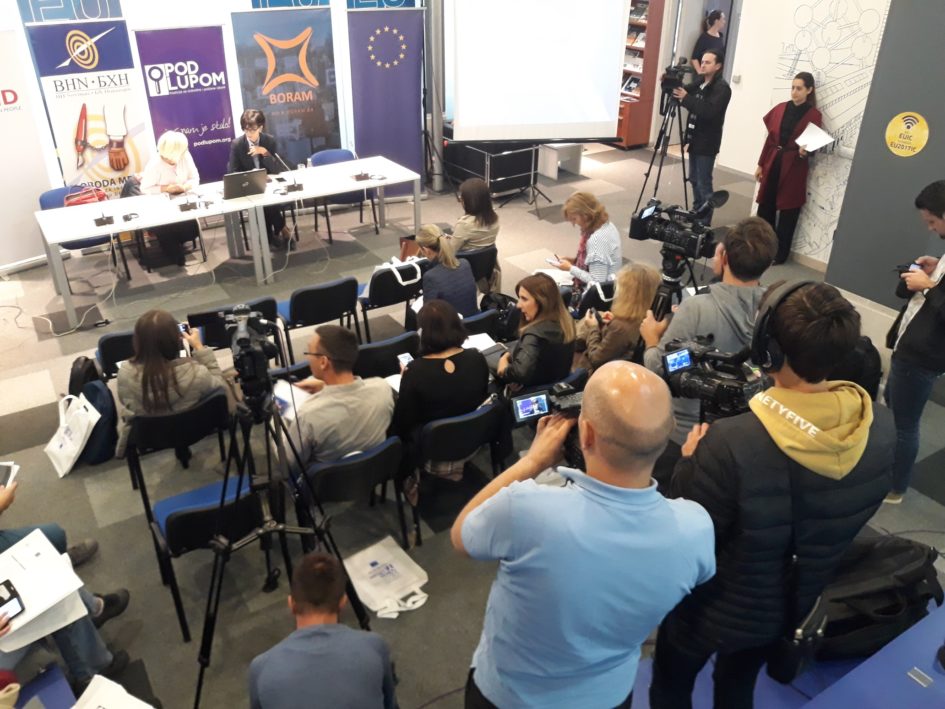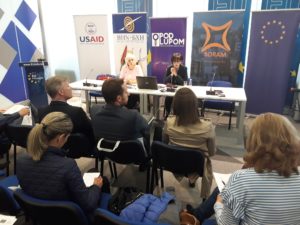
SARAJEVO, 26.09.2018. – In the first two weeks of the pre-election campaign, the media, and in particular public services, did not provide citizens with enough information to enable them to make informed choices. A significantly larger presence in media of those subjects who are already participating in the ruling system, as well as the almost complete invisibility of the new parties in BiH, has been noted. political scene. These are some of the results of the preliminary analysis of the Media Monitoring during the pre-election campaign of 2018 that was presented today in Sarajevo.
Monitoring is organized in order to determine whether and how many media contribute to citizens making an informed choice, and whether the media is reporting in the interests of political subjects or in the interests of citizens. Lejla Turčilo, professor at the Faculty of Political Science at the University of Sarajevo, author of the methodology and preliminary report, presented the key observations of media monitoring in the period from September 7 to 21.
 “Of the analyzed 10,602 media content, which were published in this period, the election content was 18%. Private television stations – 28.05% and the small public radio stations – 11.59%, said Turcilo, adding that private media (TV stations, press and portals) reported more about electoral campaign than public media.
“Of the analyzed 10,602 media content, which were published in this period, the election content was 18%. Private television stations – 28.05% and the small public radio stations – 11.59%, said Turcilo, adding that private media (TV stations, press and portals) reported more about electoral campaign than public media.
A disturbing indicator is that a large part of media space is occupied by politicians who are already public officers, and it can be said that they are privileged in the context of obtaining media space in the pre-election campaign.
Na press konferenciji su predstvaljena ključna zapažanja i preporuke za medije kako bi se do kraja predizborne kampanje unaprijedili kvalitet i raznovrsnost medijskih programa posvećenih izborima. Rečeno je kako je nedopustivo da mediji, a posebno javni servisi, zanemaruju svoju funkciju edukacije i orijentacije, kao i da je potrebno više pažnje posvetiti informisanju o izborima. Pored toga, istaknuto je i da većina medija treba usvojiti fer i izbalansiran pristup u predstvljanju poliitčkih subjekata, jer je vidljivo da ne poštuju pravo na odgovor niti daju priliku političkim subjektima da odgovore na optužbe, etiketiranje, neprimjerene kvalifikacije…
On the press conference key recommendations for media were presented at the press conference in order to improve the quality and diversity of media programs dedicated to the elections by the end of the pre-election campaign. It is said that it is unacceptable that media, and especially public services, ignore their function of education and orientation, and that more attention should be paid to informing about the elections. Additionly, it was also pointed out that most of the media should adopt a fair and balanced approach in the representation of political subjects, as it is evident that they do not respect the right to reply or give the opportunity for political subjects to respond to accusations, labeling, inappropriate qualifications …
It has been emphasized that public services, in particular RTRS, must pay more attention to various political actors, not just political parties and canadians in power. Also, the Regulatory Agency for Communications was invited to take more responsibility for monitoring the media and regulation during the election period.
The Media Monitoring is carried out on a sample of 30 media (5 daily newspapers, 10 news portals and 15 electronic media), with the intention of creating recommendations for improving media legislation and their obligations during the pre-election campaign, within the BASE project financed by the European Union and USAID, and is implementing a consortium of BH journalists Association – Boram and Coalition Pod lupom.